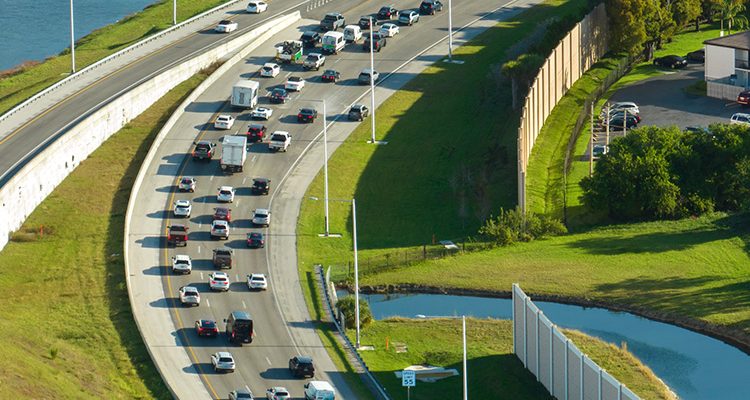
Florida’s climate is as diverse as it is unpredictable. From scorching heat to sudden downpours, and from tropical storms to the occasional tornado, the Sunshine State’s weather can pose significant challenges for drivers. As your trusted Orlando personal injury attorneys, we’ve seen firsthand how these weather conditions can turn a regular commute into a dangerous situation.
The Impact of Weather on Florida’s Roads Stats
Florida’s unique geography and climate create a perfect storm of driving hazards. According to the Federal Highway Administration, weather-related crashes account for approximately 21% of all vehicle crashes in the United States. We recently got our hands on some eye-opening data from the Florida Department of Highway Safety and Motor Vehicles for 2022, and let us tell you, it paints a vivid picture of how weather affects our roads.
Rain continues to be a major player in weather-related accidents. In 2022, we saw 183 fatal accidents, 965 incapacitating injuries, and 5,204 non-incapacitating injuries due to rainy conditions. That’s a total of 6,352 serious incidents caused by rain alone!
While less common, fog, smog, and smoke contributed to 59 fatal accidents, 121 incapacitating injuries, and 363 non-incapacitating injuries. These numbers highlight the importance of extra caution when visibility is low. Even cloudy conditions can impact driving safety. The data shows 484 fatal accidents, 2,316 incapacitating injuries, and 9,231 non-incapacitating injuries that occurred during cloudy weather.
Wet road conditions led to 343 fatal accidents, 1,686 incapacitating injuries, and 8,395 non-incapacitating injuries. Even a small amount of standing or moving water on the road can be dangerous. In 2022, these conditions resulted in 1 fatal accident, 3 incapacitating injuries, and 17 non-incapacitating injuries. This underscores the importance of adjusting your driving when the roads are slick.
Rain and Thunderstorms: Florida’s Most Common Threat
As stats show, rain is by far the most common weather-related driving hazard in Florida. Our state’s frequent afternoon thunderstorms can create sudden, dangerous driving conditions. Heavy rainfall reduces visibility and creates slick road surfaces, increasing the risk of hydroplaning and loss of vehicle control.
Tips for Driving in Rainy Conditions:
- Slow down and increase your following distance
- Turn on your headlights to improve visibility
- Avoid sudden braking or sharp turns
- Check your windshield wipers and tires regularly for optimal performance
Hurricanes and Tropical Storms: Extreme Weather Events
Florida is no stranger to hurricanes and tropical storms. These powerful weather systems bring a combination of hazards, including:
- High winds that can push vehicles off course or cause debris on the road
- Heavy rainfall leading to flooding and reduced visibility
- Storm surge in coastal areas, making roads impassable
During hurricane season (June 1 to November 30), it’s crucial to stay informed about weather forecasts and heed evacuation orders when issued.
Tornadoes: Rare but Dangerous
While less common than in other parts of the country, tornadoes do occur in Florida, often as part of larger storm systems. These rapidly forming funnel clouds can create chaotic driving conditions with little warning.
If you encounter a tornado while driving:
- Seek shelter in a sturdy building immediately
- If no building is available, pull over and stay in your car with your seatbelt on
- Cover your head and stay below the windows to protect yourself from debris
Heat and Humidity: The Silent Danger
Florida’s intense heat and humidity can also contribute to accidents, albeit in less obvious ways. High temperatures can cause tire blowouts, especially if tires are underinflated or worn. Additionally, extreme heat can lead to engine overheating and breakdowns, potentially stranding motorists in dangerous situations.
To combat heat-related issues:
- Regularly check your tire pressure and condition
- Keep your vehicle well-maintained, especially the cooling system
- Carry extra water and an emergency kit in your car
Fog: A Less Common but Serious Hazard
While not as frequent as in some other states, fog can still pose a significant risk to Florida drivers, especially in low-lying areas or near bodies of water. Fog drastically reduces visibility, making it difficult to judge distances and spot hazards.
When driving in foggy conditions:
- Use your low-beam headlights (high beams can reflect off the fog and further reduce visibility)
- Reduce your speed and increase following distance
- Use the right edge of the road or painted road markings as a guide
Staying Safe in Any Weather
Given these statistics, it’s clear that weather plays a significant role in Florida’s road safety. No matter what Mother Nature throws at us, there are some universal rules for safe weather driving:
- Stay informed – check the forecast before you head out
- Keep your car in tip-top shape – regular maintenance can prevent many weather-related issues
- Adjust your driving – slow down and give yourself extra space in bad weather
- Use the right gear – good wipers and tires can make all the difference
- Know when to stay put – sometimes, the safest trip is the one you don’t take
When the Weather Causes an Accident: Who’s Responsible?
Now, we know what you’re thinking – “If the weather caused my accident, it’s not anyone’s fault, right?” Well, not exactly. While we can’t control the weather, we are responsible for driving safely in whatever conditions we face.
Courts in Florida may consider whether a driver was exercising proper caution for the conditions at the time of the accident. This means that even if the weather plays a role in a crash, the driver could still be held liable if they were not driving appropriately for the situation. For instance, failing to reduce speed in heavy rain or neglecting to turn on headlights in low visibility could lead to a determination of negligence, impacting liability and insurance claims.
Weather-related Car Accidents in Florida FAQs
What type of weather causes most car accidents?
In Florida, rain is the most common weather condition associated with car accidents. However, severe weather events like hurricanes can lead to more catastrophic incidents.
What percentage of vehicle crashes are related to adverse weather?
Nationally, about 21% of crashes are weather-related. In Florida, this percentage can be higher due to our frequent severe weather events.
In what weather do most collisions occur?
Most weather-related collisions occur during rainfall, followed by snow and ice (which are rare in Florida but common in other states).
What season do most car accidents occur?
In Florida, the rainy season (typically June through October) sees an increase in weather-related accidents. This period also coincides with hurricane season.
What is 90% of vehicle crashes attributed to?
Approximately 90% of vehicle crashes in Florida and the United States are attributed to human factors. This includes distracted driving, speeding, failing to obey traffic signals, and impaired driving due to alcohol or drugs.
Which age group has the highest accident rate?
In Florida, drivers aged 16 to 19 have the highest accident rate. This age group is statistically more likely to be involved in crashes due to their inexperience, tendency to engage in risky driving behaviors, and lower seat belt usage rates. Additionally, young drivers are more likely to be distracted by mobile devices, contributing to a higher rate of accidents compared to other age groups.
Best Auto Accident Lawyer Near Me
If you’ve been involved in a weather-related car accident in Orlando or Central Florida, it’s crucial to understand your rights and options. At Alicia Jeskey P.A., we have over 7 years of experience handling complex car accident cases, including those involving severe weather conditions.
Don’t let the weather cloud your judgment when it comes to seeking justice after an accident. Contact Alicia Jeskey P.A. online or call us today at 407-866-0126 for a free case evaluation. We are ready to fight for your rights and help you navigate the aftermath of a weather-related car accident. Remember, we don’t charge unless we win your case. Let us put our expertise to work for you and help you weather the storm of a car accident claim.

